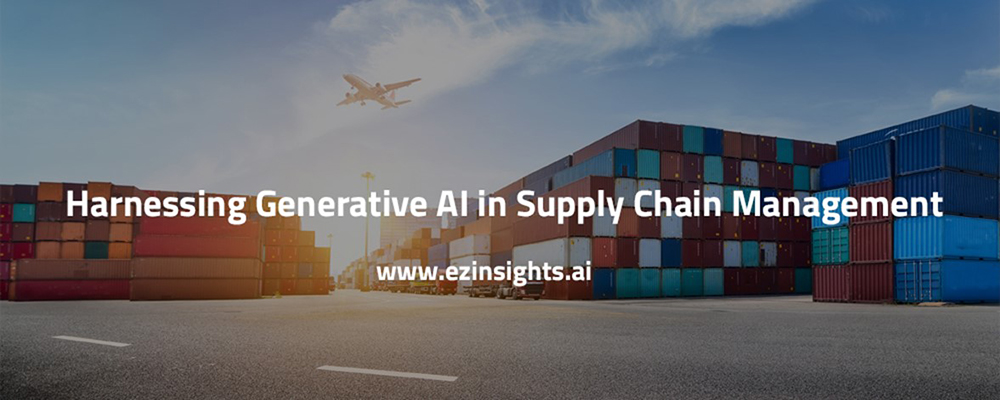In today’s fast-changing world, supply chains are critical to business operations. They ensure products move smoothly from producers to customers. However, managing a supply chain can be complex. Factors like demand shifts, rising transportation costs, and inventory control make it challenging.
The growing emphasis on a data-driven world has made using insights and analytics essential for overcoming these challenges. By applying advanced technologies, businesses can optimize their supply chain processes, ensuring efficiency and resilience. Generative AI is a game-changing technology. It helps businesses improve supply chain processes in ways that were once not possible.
Jump to:
What is GenAI in supply chain?
Evolution of Supply Chain Risk Management
How does Gen AI improve Supply Chain Risk Management (SCRM)?
10 key features of Gen AI for Supply Chain Risk Management
Challenges of GenAI for Supply Chain Risk Management
Implementing Gen AI in Your Supply Chain Risk Management Strategy
What is GenAI in supply chain?
Generative AI (GenAI) in supply chain refers to AI models that predict outcomes and generate content. It significantly improves various aspects of supply chain management. GenAI helps with demand forecasting, inventory management, and supplier relationships by analysing both structured and unstructured data.
Demand Forecasting: GenAI uses historical data and market trends to predict demand more accurately. This reduces stockouts and overstock situations.
Inventory Optimization: With real-time data, GenAI keeps inventory levels optimal. It suggests when to reorder and which products to prioritize.
Supplier Risk Assessment: GenAI analyses risk factors like geopolitical events and financial stability to assess and categorize suppliers. This enhances risk management.
Process Automation: GenAI automates tasks such as order processing and shipment tracking. This reduces errors, improves efficiency, and frees up resources.
Cost Savings: GenAI lowers costs by optimizing routes, streamlining logistics, and reducing operational inefficiencies.
Sustainability and Waste Reduction: By forecasting demand more accurately, GenAI helps reduce waste and optimize routes, minimizing carbon footprints.
Evolution of Supply Chain Risk Management
Generative AI is changing supply chain risk management. McKinsey reports that AI can reduce supply chain costs by up to 15% and increase efficiency by 20%. By using real-time data, businesses can detect risks earlier and act faster to reduce downtime and increase resilience.
A Gartner survey shows that 60% of companies already use AI in their supply chains. Another 30% expect AI to significantly reduce disruptions. With Gen AI, businesses can improve risk predictions, optimize inventory, and minimize the impact of issues like supply shortages and economic shifts.
How does Gen AI improve Supply Chain Risk Management (SCRM)?
Generative AI (Gen AI) is changing supply chain risk management. It uses large datasets to provide insights beyond traditional analytics. This helps businesses manage risks more effectively.
Predictive Analytics and Forecasting:
Gen AI looks at past data, market trends, and weather patterns. It predicts potential risks and helps businesses spot warning signs early. They can adjust their plans to avoid disruptions.
Scenario Planning and Simulation:
Gen AI helps businesses prepare for different events, like supplier failures or transit delays. It uses real-time data to simulate these events and improve response strategies.
Real-Time Monitoring and Response:
Gen AI continuously monitors supply chain activity. It detects problems and sends alerts for quick action. This reduces the impact of disruptions.
Supply Chain Network Optimization:
Gen AI finds inefficiencies in the supply chain. It optimizes routes, inventory, and suppliers. This helps businesses improve flexibility and resilience.
10 key features of Gen AI for Supply Chain Risk Management
Here are the key features of Generative AI in supply chain risk management:
Predictive Analytics:
AI analyses past data to predict potential disruptions, helping businesses prepare in advance by identifying risks before they happen.
Scenario Simulation:
AI simulates different supply chain disruptions, like supplier delays, allowing businesses to test responses and develop better contingency plans.
Real-Time Monitoring:
AI monitors supply chain activities 24/7, detecting issues and notifying businesses instantly, allowing for quick action to minimize disruptions.
Demand Forecasting:
By analysing trends and past sales, AI predicts future demand, helping businesses avoid stockouts and overstocking, ensuring smooth inventory management.
Supplier Risk Assessment:
AI evaluates suppliers’ reliability by analysing their financial health, past performance, and external factors, helping businesses make informed decisions and reduce risks.
Supply Chain Network Optimization:
AI identifies inefficiencies and bottlenecks, optimizing routes, inventory, and supplier connections, leading to smoother, faster operations across the entire supply chain.
Automated Decision-Making:
AI automates routine decisions based on data insights, reducing human errors, speeding up processes, and freeing up resources for more strategic tasks.
Cost Reduction:
By streamlining operations, optimizing routes, and improving inventory control, AI helps businesses reduce unnecessary costs, making the supply chain more cost-effective.
Continuous Learning:
AI learns from new data, improving its predictions and strategies over time, ensuring better decision-making and risk management with each cycle.
Sustainability Tracking:
AI helps businesses monitor and reduce their environmental impact, optimizing processes to cut waste and lower carbon footprints, supporting sustainable supply chain practices.
Challenges of GenAI for Supply Chain Risk Management
The use of Gen AI in Social Customer Relationship Management brings many challenges, even though it has great potential for supply chain risk management. It’s important to balance these challenges to fully harness its benefits.
Challenges include:
Authenticity and Trust: Customers may struggle to distinguish AI-generated interactions from human ones. Transparency and honesty are key to building trust.
Ethical Use: AI must handle customer data responsibly. It should remain neutral and secure, ensuring consent is obtained to avoid data privacy issues.
Scalability and Customization: AI must deliver timely, relevant, and personalized responses while handling many customers.
Integration Complexity: Integrating Gen AI with existing systems can be difficult. Data quality, operational processes, and compatibility need to be addressed.
Job Displacement and the Human Touch: The rise of AI could reduce the need for human agents. This raises concerns about job loss and the need for human empathy in customer interactions.
Implementing Gen AI in Your Supply Chain Risk Management Strategy
To fully utilize Gen AI in supply chain risk management, organizations should follow these steps:

Data Integration and Quality Assurance
Combine all relevant data sources. This includes ERP systems, IoT devices, and market feeds. Ensuring data quality is crucial for AI effectiveness.
Collaborative Learning
Promote teamwork among data scientists, supply chain managers, and AI experts. This will create AI models tailored to specific risk profiles and business goals.
Constant Improvement
Regularly monitor AI models. Implement feedback loops to adjust to market changes and improve model accuracy.
Ethical and Regulatory Compliance
Follow ethical standards and legal obligations. This includes protecting data privacy, reducing bias, and ensuring transparency.
Conclusion
In today’s dynamic business environment, generative AI is transforming risk management for supply chains. With real-time monitoring, predictive analytics, and scenario planning, businesses can manage risks effectively, adapt to uncertainties, and strengthen resilience. AI-based risk management ensures companies stay competitive and prepared for challenges.
To explore its benefits, try EzInsights AI today. Register for a free trial and discover how generative AI simplifies risk management, improves decision-making, and ensures long-term success. Don’t miss the opportunity to revolutionize your supply chain strategies!
FAQs
What is Gen AI’s role in supply chain risk management (SCRM)?
By utilizing massive datasets for predictive analytics, scenario planning, real-time monitoring, and network optimization, Gen AI transforms SCRM. By improving precision, effectiveness, and flexible risk management, it enables companies to anticipate hazards and streamline their supply chain processes.
How does Gen AI benefit SCRM processes?
Large volumes of data are processed rapidly and precisely by Gen AI, which enhances decision-making and lowers operating costs by allocating resources optimally. Real-time insights into changing hazards are made possible by it, allowing for flexible risk management techniques that strengthen organizational resilience.
What are the challenges of integrating Gen AI into SCRM?
Concerns about job displacement and the human touch in customer service are among the challenges that need to be addressed. Other challenges include managing scalability while maintaining customization, addressing ethical considerations in data handling, and ensuring authenticity and trust in customer interactions.
How can organizations implement Gen AI in their SCRM strategy effectively?
By emphasizing data integration and quality assurance, encouraging cooperative learning between data scientists and supply chain managers, iteratively improving AI models based on feedback loops, and guaranteeing ethical and legal compliance in AI-driven SCRM initiatives, organizations can integrate Gen AI. By taking these actions, you can fully utilize the potential of Gen AI to improve supply chain resilience and competitive advantage.

Anupama Desai
President & CEO
Anupama has more than 23 years of experience as business leader and as an advocate for improving the life of the business users. Anupama has been very active in bringing business perspective in the technology enabled world. Her passion is to leverage information and data insights for better business performance by empowering people within the organization. Currently, Anupama leads Winnovation to build world class Business Intelligence application platform and her aim is to provide data insights to each and every person within an organization at lowest possible cost.

